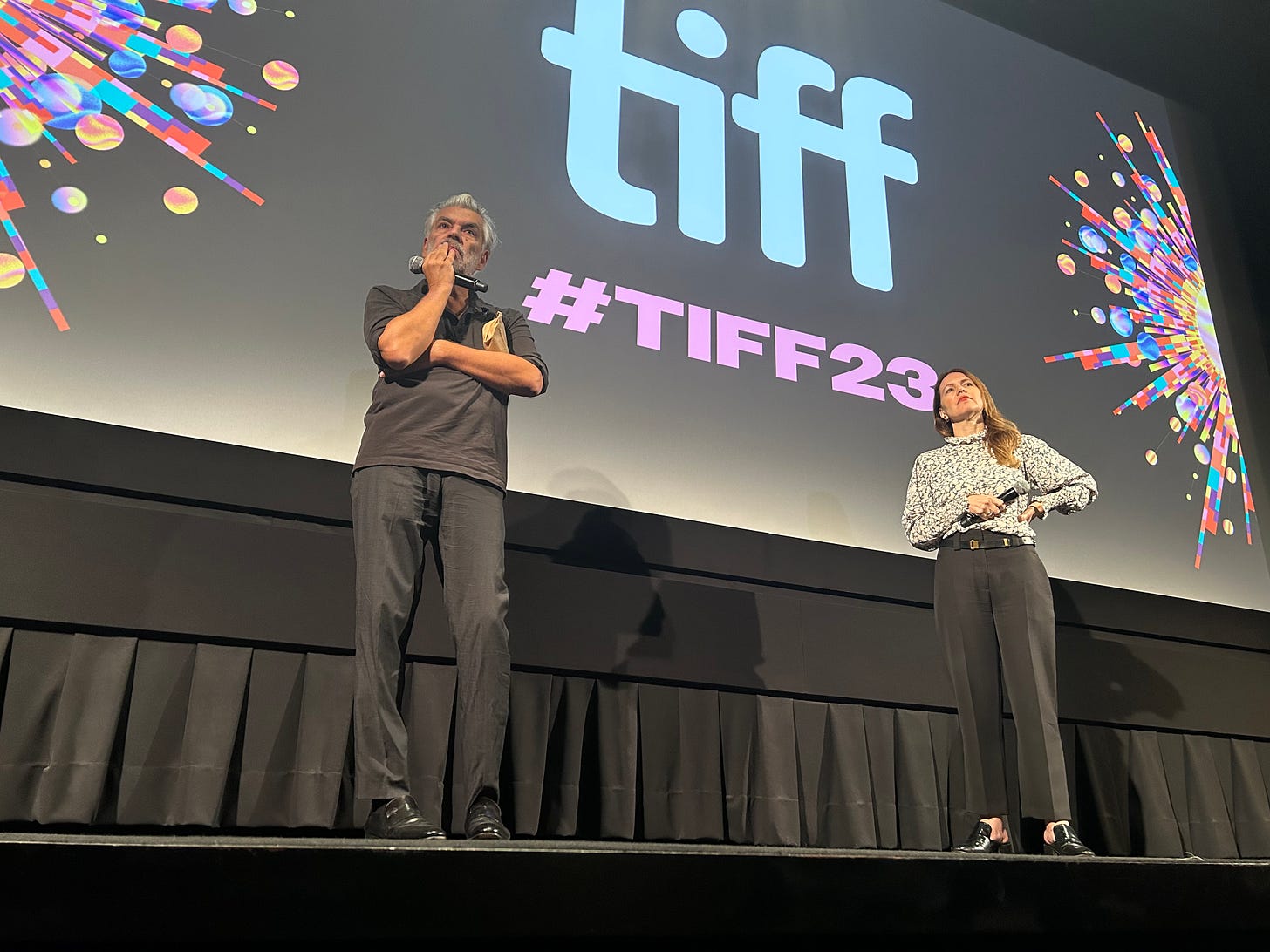TIFF Dispatch #4 and A Defense of Moralism
Godard/Akerman/Costa at Wavelengths and Why Giving a 3/5 is a Moral Judgement
Welcome mate, this is a zone of experimentation and ignorance.
We here at Sweet Void Cinema don’t know how to write nor podcast, yet here we are, doing both.
Coverage from TIFF will be found in the podcast and dispatch.
The dispatch is below the podcast.
An essay defending moralism and defining what moralism even means is below the dispatch.
Photos included are from Blair Paddock, Jay Casillas or Lino Gil
(00:00-06:00) Introduction. Blair Paddock, Jay Casillas and Lino Gil. Slept through the Nickelback doc and Boy Kills World, so what’s the fucking point. Lino made a joke about directional sound but honestly before and after they shifted I can’t tell the difference in sound quality. Jay experiences emotional sincerity and I decide not to cut it out. (I can’t.)
(6:00-15:00) Touki Bouki and a 2013 short by Mati Diop which played prior, “A Thousand Suns” talk from Lino and Blair.
(15:00-50:30) Wavelengths: Godard, Akerman, Costa. Also some bumper talk. How does Lino identify the artist of the song behind the Bulgari ad?? What??! First talk about the Akerman movies, then the Costa, then the Godard.
(50:30-53:32) Outro. GTA comes up. Substack Q: What horrible person would you want to meet? Apparently these podcasters think I’m the worst... oh well :-(
Blair also saw The Human Surge 3 but didn’t mention it. Crazy, no?
Dispatch
Bruxelles: à la Foire du Midi
I was very lucky and privileged to be able to attend the special Wavelengths screening in which Chantal Akerman's first four short films were screened. Saying that these are rarely seen is an understatement, this film alone only has 25 entries on letterboxd. These films were presented to us from the collection of Chantal's sister, these were essentially private/semi-lost films we were getting a chance to look at.
I'm going to only use this entry to talk about all of the films since I have the same thing to say about all of them. Which is to say that I couldn't help but to just be so deeply moved by these films. They were these four films of Ackerman just shooting whatever she thought was interesting. She shoots her friend, her mother, strangers, animals, cars, Ferris wheels, and herself. It touched me that she started by making 4-minute shorts in which she points a camera at anything she finds interesting. It's what everyone's baby's first experimental short films look like. I used to see films like these from my classmates in film school, I see them monthly as I look over the short film submissions for Sweet Void Shorts Fest, and I've made shorts just like this. They're not groundbreaking but they show promise and a young person's exploration of the art form. It's as if you went into a private room in a museum and you saw this display of the first smiley face or stick figure that Michelangelo ever drew.
Hopefully, these get released to the public someday, These deeply inspired me and I could only imagine that they could do the same for so many inspiring filmmakers.
Thank you, Akerman.
The Daughters of Fire
Apart of the same Wavelength screening. It's crazy that these films all fit together as all being test/proof of concept films. This is Costa just testing out doing a musical film, some beautiful artificial studio set work. Hopefully, the feature version of this gets funded and comes out. It doesn't look like anything else out right now and we just need more of that hyper-artificial look in modern cinema.
Trailer of a Film That Will Never Exist: Phony Wars
It was touching to see the last creative breath from an artist that I look up to so much. Godard’s films have formed the way I want to edit, shoot, and structure my films. So I got a little emotional watching this, knowing that he still had so much left in him and that he didn’t have enough time or money to say everything he wanted. It’s a tragic but yet beautiful swan song if there ever was one. It was a good way to end the Wavelength screenings, we saw the inception of a creative with Akerman, the contemporary progress of Costa, and the epilogue of Godard. Never again will there ever be programming that alines this well, it’s as if I had experienced some sort of cosmic alignment to ge the privilege of experiencing this screening. Definitely check out the Wavelength screenings at tiff if you ever get the chance :)
A Defense of Moralism
An interesting task. To defend a discarded value which hypocritically is utilized on the regular by its greatest attackers.
There is a kind of distanced cynicism from many young cinephiles.
I was one. Nihilism in cinema is what originally caught me. Tarantino movies, genre flicks with political themes I ignored or didn’t understand.
I wanted violence and many of my high school scripts were incredibly violent.
On its face, violence in cinema isn’t something to be derided. Many of those who vocally detest moralism would likely sneer here, this a point worth making. It’s the entire endorsement versus depiction argument.
I would make the argument that depicting something in a way endorses it. In the “text” itself (a term I dislike) one can point out disagreeing with actions of the characters, yet the movie can continue the character’s actions. As Baudrillard argued with Apocalypse Now, sometimes a movie can create a violence the real world is incapable of. Perhaps many of those who believe ambivalent depiction doesn’t reinforce actions of characters would do better to rewatch their own movies: The Wolf of Wall Street, Don’t Look Up or i’m thinking of ending things.
There exist movies I love with political values I detest or firmly reject. Many a Samuel Fuller or Howard Hawks flick reinforce different shades of Liberalism yet simultaneously reinforce immediacy.
Recently I have been fascinated by Clint Eastwood’s directing career. After the chair incident, which occurred during the 2012 RNC convention, I wrote him off. I was a junior in high school and imagined he was a senile old man. Yet, his recent work appears to be extraordinarily sober-minded.
The Mule or The 15:18 to Paris, was he on one? Yes, certainly. Yet, both of those works are fascinating in very different ways, yet made in the same year by an 88 year-old. Both maintain a kind of moralism, as does every Clint Eastwood movie. He’s a man with a firm set of beliefs.
Apparently he’s a Libertarian these days, though I’d doubt he has any idea what’s going on in the party. If he does, it’s doubtful he’s a part of the Mises Caucus or anything like that.
Some values are obvious in Eastwood’s work. He hates bureaucracy. It inhibits professionals from doing their jobs. He believes in individuals and hard work. Though he maintains patriarchal norms, he violently defends pluralism.
Fifty bucks says he’s a flat-tax guy. Like, if there were anyone running explicitly on that, he’d support them.
Two days ago, I wrote about the Third Point, and at many points compared it to an ideology. Is this a way to be just? A movie has an audience by catering to a kind of Third Point. Likewise, a many movie could be said to have audiences which agree with some core values.
Some niche streaming services exemplify this. Pureflix, of course. Criterion Channel too appears to have audiences of certain moral standards.
But those aforementioned nihilists are subscribing to Criterion Channel, how could they, those who cast away the good and the bad, be moralists?
By the simple virtue of what they value as good and bad.
Our generation is one delusional via self-awareness. We believe to have our actions under control and yet we don’t. There is no limit to our violence and do not understand it.
The movie viewer these days logs the movie on Letterboxd or talks to a friend or family member about the movie. The first question asked? “Did you like it?” Yes or no determines a moral position. This is an obviously true when applied to an extreme example:
“Did you like the movie?”
“No, I did not enjoy Triumph of the Will.”
Suggesting otherwise would be to support its content, no? Many have, of course. Susan Sontag, most famously. She did change her mind, later in life. She believed style as substance had limits.
Nietzsche asked humanity to search beyond good and evil for moral values. This was not to say he did not believe in the good and the bad. Rather, he applied his German time and place’s values against other generations and found that morals were shifting, people were believing in less and less. This lack of belief created a kind of cynicism which bred sadism and ambivalence to violence, calcified eventually by xenophobia and hyperinflation.
When you give Chef by Jon Favreau a 2.5/5 on Letterboxd are you making a moral judgement?
Yes. You are clearly making a system for yourself of what you deem “better” and “worse” when laid against other moral judgements, or, the other movies you have rated on Letterboxd.
Perhaps you simply say, “I liked it.” Is this not a judgement?
Perhaps content matters and doesn’t. The form and immediacy the audience has of course matters. It’s why people gravitate to Million Dollar Baby or Schindler’s List. The Roger Ebert definition of cinema as an empathy machine. This is delusion, yet it’s nice to imagine. Empathy cannot have an art-form exclusive to it.
Yet we can look at movies together from a certain vantage point. Make similar judgments or find blindspots in each other’s filmographies. Make moral judgements with each other, find our shared ground, find where we differ.
I imagine these disagreements arise from what we believe movies to be for. From where we draw our moral conclusions.
Those thoughtless enough to believe in nothing (consciously or not) are those to have no stake in opinion to movies. Or art. They see and find distance, no immediacy whatsoever no matter what’s in front of them.
It’s unclear what to make of these fellas. Perhaps it’s simple, no art-objects, these people don’t share many perceptions.
When confronted, it’s possible to accept or reject the new perceptions. The new art being created through new subjects viewing new art-objects.
I think of Ridley Scott’s not great 1492: Conquest of Paradise. There are moments of beauty. One is when the Native Americans and imperialists meet. They face each other head on and laugh.
They accept each other at this moment, confused and amused by difference.
If there’s one lesson to be learned from neoliberalism it’s pluralism. Change of any kind is motion and only through motion can the earth keep moving round.








